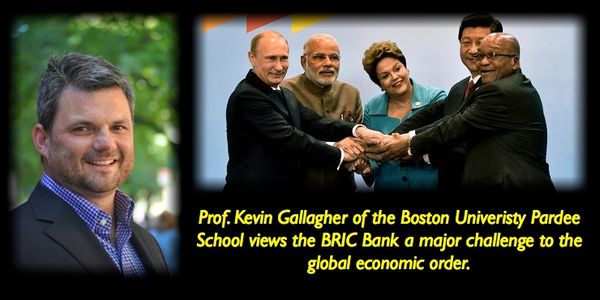Gallagher Sees Global Economic Governance Shift
 Leaders of the five BRICS countries – Brazil, Russia, India, China, South Africa – were busy this week in Fortaleza, Brazil, at the 5th BRICS Summit. So was Prof. Kevin Gallagher of the Frederick S. Pardee School of Global Studies at Boston University.
Leaders of the five BRICS countries – Brazil, Russia, India, China, South Africa – were busy this week in Fortaleza, Brazil, at the 5th BRICS Summit. So was Prof. Kevin Gallagher of the Frederick S. Pardee School of Global Studies at Boston University.
Prof. Gallagher, who also leads the Global Economic Governance Initiative (GEGI) at BU – housed at the Pardee School of Global Studies, the Pardee Center and the Center for Finance, Law and Policy – has been the go-to expert for leading media sources from across the world as they tried to understand the significance of the Summit and, more particularly, the importance of the changing landscape of China-Latin America relations and the new global development bank that the BRICS nations have agreed to form.
Following on from a blitz of media interviews in the run-up to the BRICS summit, Prof. Gallagher has been deciphering the import of the meeting as it unfolded. For example, in a report in The New York Times (July 15) Prof. Gallagher explained that with half of the world’s population the influence of these countries will continue expanding because:
“They are a force regardless of their growth rate, which will remain faster when averaged than the West’s for years to come.”
However, he also pointed out to Reuters in a reprot the same day that not all will be easy on the road ahead:
“Sometimes when you get down to the actual negotiations and countries want more say, they forget about some of their lofty aspirations when they were criticizing the IMF and World Bank.”
Importantly, Prof. Gallagher points out that the significance of the summit and its decisions are not only on the economic governance system but also on the political balances of power and alliances. In an Assocaited Press report carried by multiple publications, including The Washington Post, Prof. Gallagher commented on how Russian and Chinese leaders have been feted in USA’s Latin American backyard and particularly in countries where the US has not been seen very favorably in recent years:
“These are all countries the U.S. has some real question marks about… It’s going to require some PR so as not to be interpreted in certain, phobic circles as an overt alignment with left-leaning governments at odds with the U.S.”